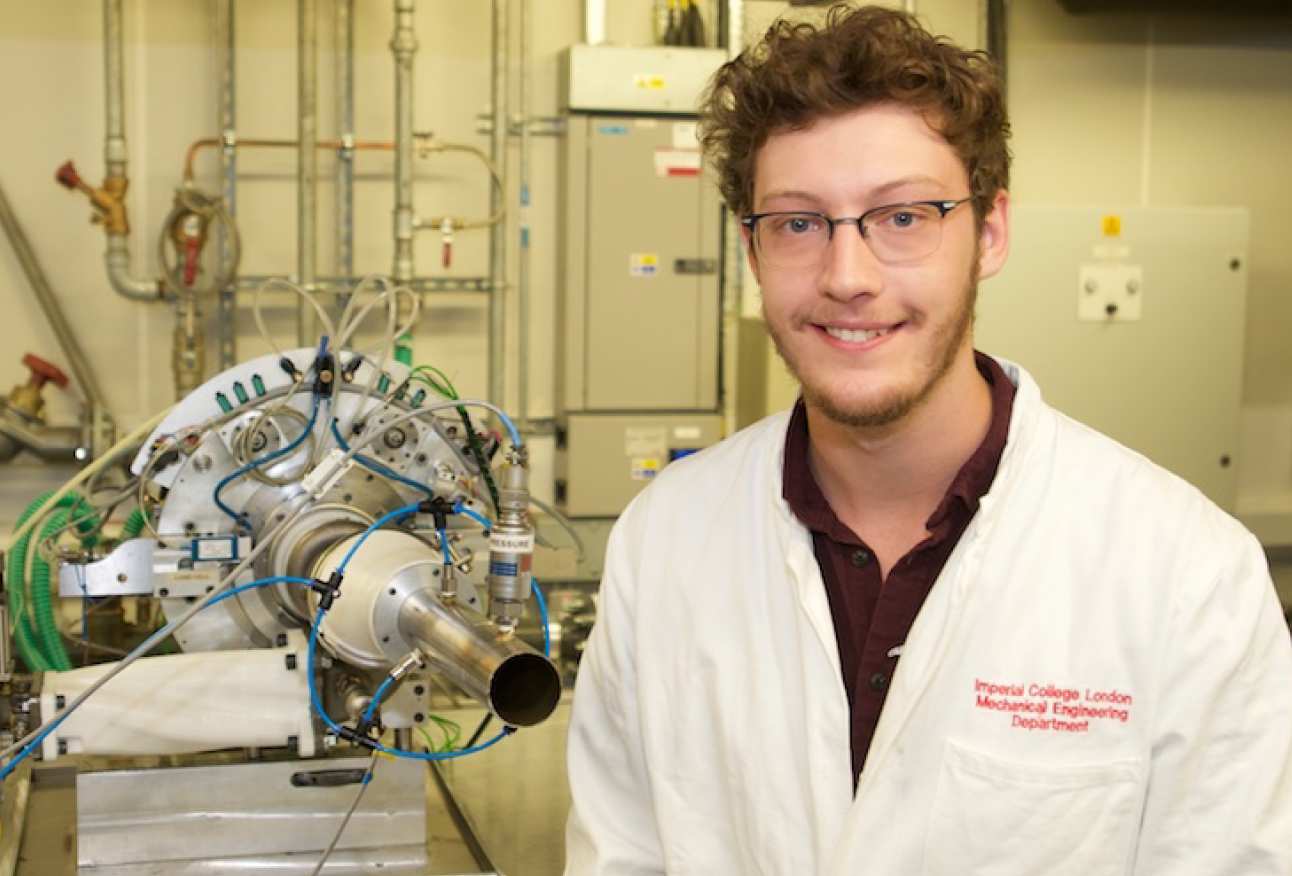Miles
Miles is in the 2nd year of his PhD in the Thermofluids Division.
"My supervisors are incredibly supportive: I’m about 14 months into my PhD and I’ve already attended three conferences, and presented at one of them."

When did you decide to do a PhD and why?
I studied my undergraduate degree here at Imperial, in Mechanical Engineering. As part of that I spent a Year in Industry with McLaren Automotive working on hybrid systems for their P1 supercar. Towards the end of my final year, I was fortunate enough to be offered both a position with McLaren and also a PhD project with my undergraduate project supervisor. I ended up choosing the PhD: as the proposed project was exciting, I worked well with my supervisor, and it seemed like an excellent investment of time and effort.
What is your PhD research about?
I’m in the turbocharger research group and we work on designing turbines and compressors, typically for automotive applications. My project is focused on mobile Organic Rankine Cycle (ORC) systems, which operate in a similar fashion to large power plants, but are instead powered by vehicle exhausts to recover waste heat. My project has elements of both numerical and experimental work, so I can both create and test new designs for ORC turbines. Ultimately this hopes to provide a significant reduction to vehicle emissions and fuel consumption.
Having previously worked in industry, I was keen from the outset to ensure I was working in an area with real impact. The project is part of an industrial consortium, meaning I get to interact with both academia and industry – it provides a good blend of the two and it is exciting seeing new concepts getting put into practice!
Can you describe your experiences studying a PhD here?
When you start off you’re suddenly immersed in a topic and it’s easy to feel a little lost, however as you progress it becomes easier to determine what to do. I think this is where a good supervisor is essential, to provide guidance, direction and encouragement. It’s very exciting as you progress and the research project really becomes your own. I like the sense that I am becoming an expert in my area and am able to work independently: having control of what I do on a day to day basis is something I really enjoy.
I’m also an Imperial PhD Scholar. The IC PhD Scholarship is a great opportunity as it allows you to study the project that you want. The Graduate School also run a programme of events specifically tailored for the Imperial PhD scholars. It’s definitely worth applying to the scheme if you meet the requirements.
If I had to choose a word to describe my PhD, I’d say “impact”. It’s important to me to be working on something that will make a difference.
Have you participated in any of the activities offered for postgraduate students?
I attended the Imperial-MIT Global Fellows Programme. It was really, really good! About 10-15 students from Imperial went out to Boston, and we participated in a summer school, developing our skills in team work and collaboration with PhDs at MIT. I definitely made some contacts which will be useful for the future. It was a great chance to come up with ideas working with students in completely different fields.
What would you say about the supervision you receive?
I have two main supervisors. This gives me the best of both worlds: they’re both excellent, and each offer great support. I catch up with my main supervisor every couple of weeks, but talk to my second supervisor much more frequently: every week or so at least.
I’m also fortunate in that because my project is linked to industry, my PhD is planned around the timeline of the industry project. That means that even if I may not have big deadlines looming, there is usually a little bit of pressure to continue to progress as part of the wider programme of work.
What has been the best thing so far about your experience of coming to study for your PhD here?
I have really enjoyed how willing colleagues are to allow me to go and try new things. My supervisors are incredibly supportive: I’m about 14 months into my PhD and I’ve already attended three conferences, and presented at one of them. It’s great to be in an environment which is motivating and challenging, yet so supportive.
What do you think about living in London?
Well, I’ve lived here rather a long time now! I think you have to be prepared for the cost, but London’s amazing – it’s expensive for a reason! It’s very vibrant and there’s something to do 24/7, which I like.
Do you have any thoughts about where you might like to go in the future?
At the moment I’m tempted by both a career in academia and a career in industry! One of the things I’ve realised since starting my PhD is that it is possible to move between the two areas – my supervisor worked in industry for some time before returning to academia and this would be a tempting option.
What advice would you offer to students considering applying for a PhD at Imperial?
Make sure you enjoy what you are doing! Don’t apply for a PhD just because of the reputation of the institution, it’s got to be the right project for you. Make sure you have a supervisor with whom you can work well. It can be a good idea to take recommendations and advice from others whom you trust when you’re thinking about a PhD and potential supervisors.
For me, although the work is extremely independent, research is not about sitting behind a desk in isolation for 3 years. Collaboration and engagement are so important – you’ve got to take opportunities to get out and about, and explain your research to others.


